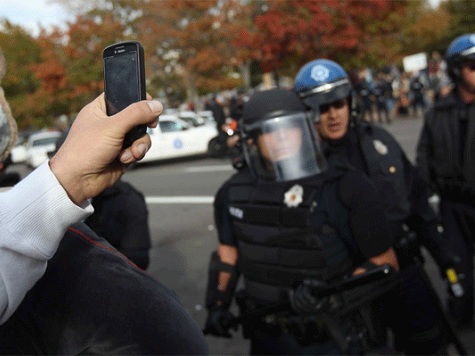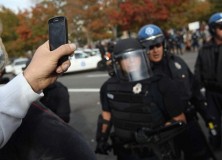 It’s well known that police don’t like being recorded on video. Too often it raises embarrassing questions about their conduct and in some instances actually proves they can and do lie on official reports about an incident, or the actions of an individual they have arrested.
It’s well known that police don’t like being recorded on video. Too often it raises embarrassing questions about their conduct and in some instances actually proves they can and do lie on official reports about an incident, or the actions of an individual they have arrested.
When recordings first began appearing that were getting cops reprimanded, charges against people dropped, and lawsuits filed, law enforcement responded by going after those who were doing the recording. People were being arrested for filming, with police claiming they were “interfering” with an arrest, or refusing to comply to their orders (to leave the area, or stop filming).
For awhile, police had the upper hand with these arrests. Local judges sided with their municipalities and handed out penalties to offenders.
It took time for appeals to wind their way through the courts, but in case after case, higher courts are still upholding citizens’ constitutional rights to film police as long as they don’t interfere with the arrest. Increasingly, cities throughout the U.S. are letting their law enforcement know that arresting a citizen for filming them is no longer the appropriate response.
Indianapolis, Indiana has only recently come to understand this.
The terms of a recently settled lawsuit in Indianapolis, Indiana will require the city’s police force to remind officers that it’s legal for civilians to videotape on-duty cops, but it will also cost the department more than just that.
In addition to having to adopt an official policy recognizing the right for citizens to record law enforcement officials, the City of Indianapolis is also cutting a $200,000 check for a local man who was arrested and injured by police in 2011 after he refused to stop filming a nearby arrest.
Willie King was watching Indianapolis police officers arrest a young man in his neighbor’s driveway three years ago this month when he decided it would be a good idea to grab his cellphone and start recording. The cops weren’t too keen about being caught on film, however, and ordered King, then 66 years old, to hand over his phone.
“Sir, you know that if he resists any more they can take your phone as evidence,” an officer was caught saying, according to transcripts published this week by local news network WISH-TV.
“I don’t give a [expletive] what you do, y’all just don’t harm him,” King responded.
When King refused to stop recording from his neighbor’s porch, he was tackled to the ground, arrested and charged with resisting arrest, disorderly conduct and public intoxicating.
King was ultimately found not guilty of those charges, but turned around and filed a civil suit against the city over alleged First, Fourth and Fourteenth Amendment violations.
That case was scheduled to go to trial starting March 10, but it’s now been reported that the city decided to settle this past January.
King is being awarded $200,000 from the city as part of that settlement, but the Indianapolis Metropolitan Police Department is also being forced to institute a new policy prohibiting police officers from bothering with eyewitnesses who are recording their actions.
According to excerpts of the policy published on Thursday by WISH-TV, local law enforcement officials have 60 days to adopt a policy that states “police officers should not interfere with civilians who are observing or recording their actions by video or audio in public, so long as the civilians maintain a safe and reasonable distance if necessary from the scene of a police action, do not physically interfere with the officers’ performance of their duty and do not represent a physical danger to the officers, civilians or others.”
“Willie King was wronged when the officers stopped his videotaping and took away his cellphone,” King’s attorney, Richard Waples, was quoted as saying by The Indiana Lawyer website. “We want to make sure that in the future police officers understand that people have the right to video record their actions.”
“We thought it was important in this case, not to just try to get compensation from Mr. King which we were able to do, but also to get the police department to realize, hey, they need to train their officers, and say you can’t interfere with people’s rights to record and observe what you’re doing in public,” Waples told the network.
According to Marilyn Odendahl at The Indiana Lawyer, Waples added that the recent victory “secures the right of all citizens to observe and record police officers’ public actions.”
Previously, the United States Court of Appeals for the Seventh Circuit — whose jurisdiction includes Indiana, among other states — acknowledged that “The act of making an audio or audiovisual recording is necessarily included within the First Amendment’s guarantee of speech and press rights as a corollary of the right to disseminate the resulting recording.”
“Taking photographs of things that are plainly visible from public spaces is a constitutional right – and that includes federal buildings, transportation facilities and police and other government officials carrying out their duties. Unfortunately, there is a widespread, continuing pattern of law enforcement officers ordering people to stop taking photographs from public places, and harassing, detaining and arresting those who fail to comply,” reads a portion of the American Civil Liberties Union’s official website.
Disclaimer: On January 4, 2016, the owner of WestEastonPA.com began serving on the West Easton Council following an election. Postings and all content found on this website are the opinions of Matthew A. Dees and may not necessarily represent the opinion of the governing body for The Borough of West Easton.







